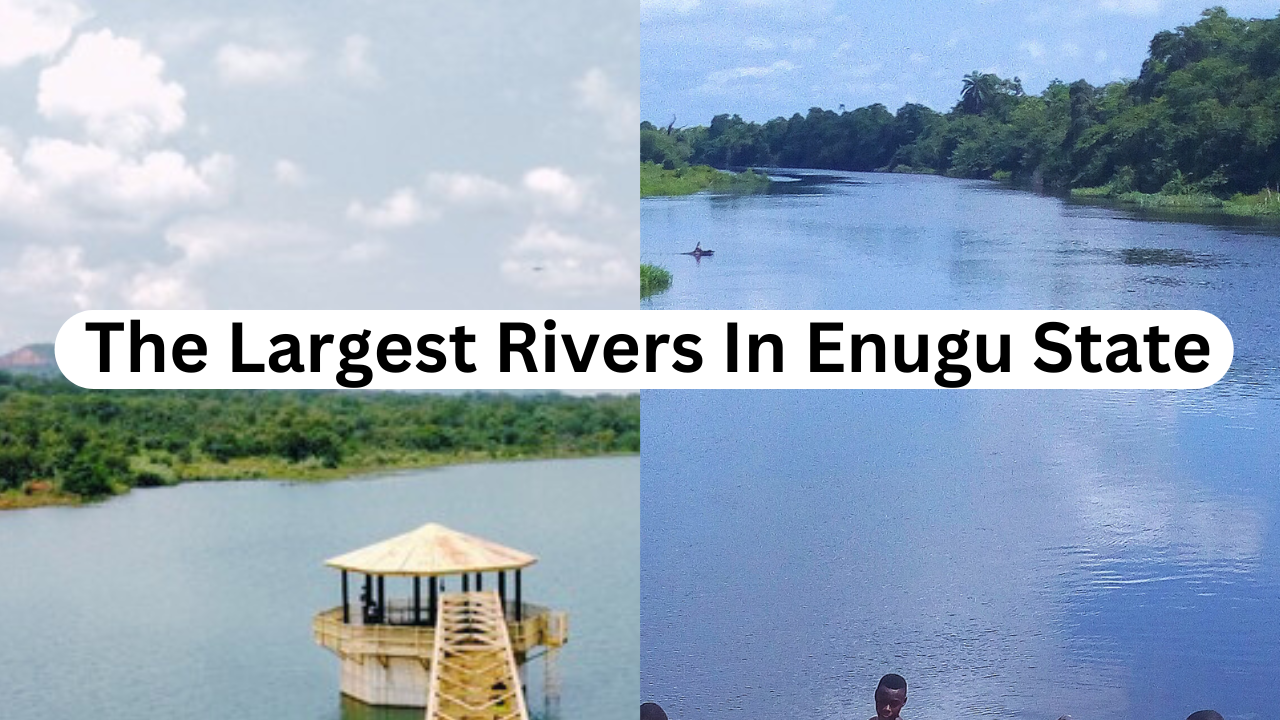
Top 20 Rivers In Enugu State
There are many rivers in Enugu State, Nigeria. Here are some of the largest rivers in the state:
These rivers are all located in the southeastern part of Nigeria, and they play an important role in the ecology and economy of the region. The Ekulu River is the largest river in Enugu state, and it is a major source of water for the city of Enugu. The other rivers are also important sources of water for irrigation, fishing, and transportation.
In addition to their practical uses, the rivers in Enugu state are also important cultural and historical landmarks. The Ekulu River, for example, is said to be the site of a battle between the Igbo and the Hausa in the 19th century. The Asata River is also known for its beautiful waterfalls.
The rivers in Enugu state are a valuable asset to the region, and they play an important role in the lives of the people who live there.
- Adada River
Adada River is a river in Enugu State, Nigeria. It is a major source of water for the people of Nsukka and its environs. The river is also used for irrigation, fishing, and recreation.
The Adada River originates from the hills of Uzo Uwani Local Government Area of Enugu State. It flows through the towns of Nkpologwu, Ibagwa Nike, Nsukka, and Iheaka before emptying into the Anambra River.
The Adada River is a perennial river, meaning that it flows all year round. However, the river’s flow can be affected by rainfall and drought. In the rainy season, the river can swell and overflow its banks, causing flooding. In the dry season, the river can dry up in some places.
The Adada River is an important part of the culture and history of Nsukka. In the past, the river was used for religious ceremonies and rituals. The river is also mentioned in some Igbo folktales and legends.
In recent years, the Adada River has been polluted by agricultural runoff and industrial waste. This pollution has caused the river to become unsafe for swimming and fishing. The government of Enugu State is working to clean up the Adada River and restore it to its former glory.
In 2019, the Adada River resurfaced after disappearing for many years. This was seen as a sign of good luck by the people of Nsukka. The resurfacing of the river is also seen as an opportunity to revive the culture and history of Nsukka.
The Adada River is a vital resource for the people of Nsukka. It is important to protect the river and ensure that it remains a clean and healthy source of water for the future.
In addition to these rivers, there are many smaller rivers in Enugu State. These rivers are important sources of water for drinking, irrigation, and transportation. They also play a role in the local ecosystem.
2. Ekulu River
The Ekulu River is a 25-kilometer (16-mile) long river and the largest body of water in the city of Enugu in Enugu State, southeastern Nigeria. It originates in the Nsukka Hills, just west of Enugu, and flows eastwards through the city before joining the Agbani River near the town of Nkanu East.
The Ekulu River is a perennial river, meaning it flows year-round. However, its flow rate varies significantly with the seasons. During the rainy season, the river can swell to a large size and flood its banks. In the dry season, the river can shrink to a much smaller size and even dry up in some places.
The Ekulu River is an important source of water for the people of Enugu. It is used for drinking, irrigation, fishing, and recreation. The Enugu State Water Corporation also operates a water treatment plant on the river, which supplies water to parts of the city.
In recent years, the Ekulu River has become increasingly polluted. This is due to a number of factors, including industrial waste, sewage, and agricultural runoff. The pollution has had a negative impact on the river’s ecosystem and its usefulness as a source of water.
There are a number of steps that can be taken to protect the Ekulu River from pollution. These include:
- Stricter enforcement of environmental regulations
- Increased investment in wastewater treatment facilities
- Education of the public about the importance of keeping the river clean
By taking these steps, we can help to protect the Ekulu River and ensure that it continues to be a valuable resource for the people of Enugu.
Here are some additional facts about the Ekulu River:
- The river is named after the Ekulu people, who are an ethnic group native to the area.
- The Ekulu River is home to a variety of fish species, including catfish, tilapia, and mudfish.
- The river is also home to a number of reptiles, including snakes, turtles, and crocodiles.
- The Ekulu River is a popular destination for swimming, fishing, and picnicking.
- The Ekulu River is an important part of the cultural heritage of the Enugu people. It is often featured in traditional songs and stories.
3. Asata River
The Asata River is a perennial river in Enugu State, Nigeria. It is one of the major rivers that drain the Enugu metropolis. The river originates from the Nkanu Mountains in the southeastern part of the state and flows through the city of Enugu before joining the Ekulu River. The Asata River is about 19.8 kilometers long and has a drainage basin of about 100 square kilometers.
The Asata River is an important source of water for the people of Enugu. It is used for drinking, irrigation, fishing, and recreation. The river is also home to a variety of aquatic life, including fish, turtles, and crocodiles.
The Asata River is facing a number of challenges, including pollution, sedimentation, and climate change. These challenges are threatening the quality and availability of water for the people of Enugu. It is important to take steps to protect the Asata River and ensure that it continues to be a reliable source of water for the future.
Here are some additional facts about the Asata River:
- The river is named after the Asata community, which is located near its source.
- The Asata River is a popular destination for fishing and swimming.
- The river is also home to a number of shrines, which are dedicated to the water spirits.
- The Asata River is an important part of the Igbo culture and mythology.
- The river is facing a number of challenges, but there are efforts being made to protect it.
4. Ogbete River
Ogbete River is a river in Enugu State, Nigeria. It is one of the major rivers in the city of Enugu. The river originates from the Udi escarpment and flows eastwards through the city. It is a tributary of the Asata River, which in turn is a tributary of the Ekulu River.
The Ogbete River is an important source of water for the people of Enugu. It is also used for irrigation, fishing, and recreation. However, the river is also facing a number of challenges, including pollution, sedimentation, and climate change. These challenges are threatening the quality and availability of water for the people of Enugu.
One of the biggest challenges facing the Ogbete River is pollution. The river is polluted by a number of sources, including sewage from the Ogbete Main Market, industrial waste, and agricultural runoff. This pollution has made the river unsafe for swimming and fishing. It has also killed fish and other aquatic life in the river.
Another challenge facing the Ogbete River is sedimentation. The river is prone to sedimentation because it flows through a heavily urbanized area. This sedimentation has reduced the depth of the river and made it difficult for boats to navigate. It has also made the river more susceptible to flooding.
Climate change is also a challenge facing the Ogbete River. Climate change is causing the river to dry up more frequently. This is because the river is fed by rainwater, and climate change is causing less rain to fall in Enugu.
The challenges facing the Ogbete River are serious. It is important to take steps to protect the river and ensure that it continues to be a reliable source of water for the people of Enugu. Some of the steps that can be taken to protect the river include:
- Reducing pollution from the Ogbete Main Market and other sources.
- Preventing sedimentation in the river.
- Adapting to climate change by building dams and reservoirs to store water during the rainy season.
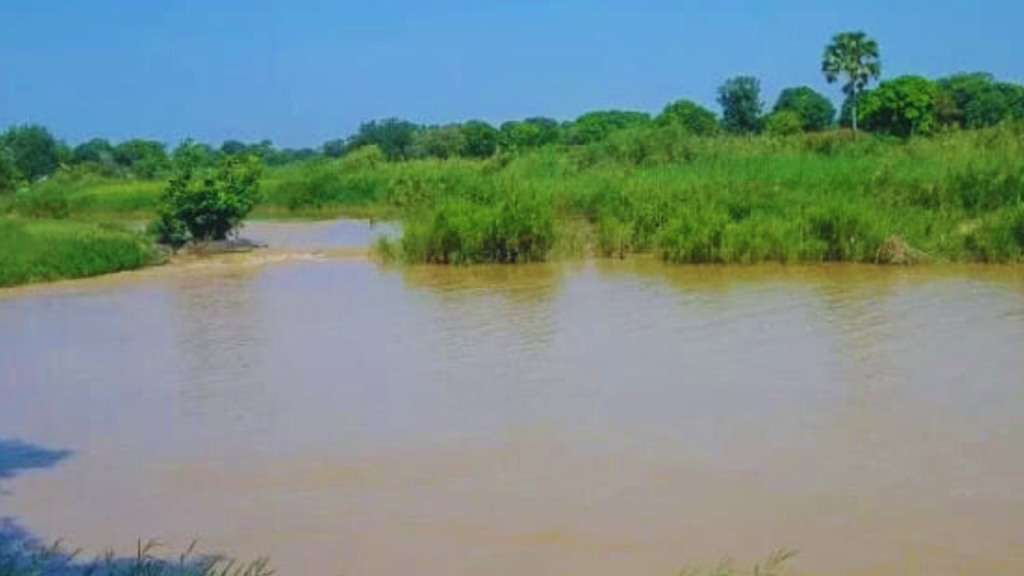
5. Aria River
The Aria River is a river in Enugu State, Nigeria. It is a tributary of the Oji River. The Aria River originates in the Nsukka Hills and flows through the towns of Nsukka, Ibagwa, and Udi. It joins the Oji River near the town of Agbani.
The Aria River is a vital source of water for the people of Enugu State. It is used for drinking, irrigation, fishing, and recreation. The river is also home to a variety of wildlife, including fish, crocodiles, and hippopotamuses.
In recent years, the Aria River has been facing a number of challenges. These challenges include pollution, sedimentation, and climate change. Pollution from agricultural runoff and industrial waste has degraded the water quality of the river. Sedimentation from soil erosion has reduced the depth of the river and made it more difficult for fish to spawn. Climate change is causing the river to dry up more frequently, which is impacting the livelihoods of people who rely on the river for their water supply.
There are a number of steps that can be taken to protect the Aria River. These steps include:
- Reducing pollution from agricultural runoff and industrial waste.
- Controlling soil erosion.
- Building dams to store water during the rainy season.
- Educating the public about the importance of the river and how to protect it.
By taking these steps, we can ensure that the Aria River continues to be a vital source of water for the people of Enugu State for many years to come.
Here are some additional facts about the Aria River:
- The Aria River is about 100 kilometers long.
- The river is widest at its confluence with the Oji River, where it is about 100 meters wide.
- The Aria River is shallow in most places, with an average depth of about 2 meters.
- The river is home to a variety of fish species, including catfish, tilapia, and carp.
- The Aria River is also home to a variety of birds, including herons, kingfishers, and ducks.
- The Aria River is a popular destination for fishing and swimming.
Idaw River is a developing residential neighborhood in the city of Enugu, Nigeria. It is located in Enugu south local government area. The Area known as Idaw River is located along Agbani road and stretches from there to Uwani and and Ikirike Hill also Known and referred to as Mountain Idaw or Idaw River Hill.
The river which gave the area its name is no longer in existence. There are a lot of stories about how the area got its name, but it is still unclear which is true. Some people say that the river was named after a woman named Idaw who lived in the area. Others say that the name comes from the Igbo word “ida” which means “to flow.”
Idaw River is a popular place to live because it is close to the city center and it is surrounded by hills. The hills provide a scenic backdrop and they also help to keep the area cool. The neighborhood is also relatively quiet and crime-free.
There are a few schools in Idaw River, including Idaw River Girls Secondary School and Mountain of Fire and Miracles Ministries Primary and Secondary School. There are also a few churches and mosques in the area.
Idaw River is a rapidly developing neighborhood and it is expected to become even more popular in the coming years. The area is well-positioned to become a major residential and commercial hub in Enugu.
Here are some interesting facts about Idaw River:
- The first school in the area was Idaw River Girls Secondary School, which was established in 1977.
- The area is home to a number of hills, including Ikirike Hill and Mountain of Fire and Miracles Ministries Hill.
- Idaw River is a popular place to live because it is close to the city center and it is surrounded by hills.
- The neighborhood is also relatively quiet and crime-free.
- Idaw River is a rapidly developing neighborhood and it is expected to become even more popular in the coming years.
7. Nyaba River
The Nyaba River is a stream located in Enugu State, Nigeria. It is a tributary of the Oji River. The Nyaba River originates in the hills of Nkanu West Local Government Area of Enugu State. It flows through the towns of Nkanu West, Ibagwa-Aka, and Igbo Eze North Local Government Areas. The Nyaba River finally joins the Oji River at the town of Oji River.
The Nyaba River is a vital source of water for the people of Enugu State. It is used for drinking, irrigation, fishing, and recreation. The Nyaba River is also home to a variety of wildlife, including fish, crocodiles, and birds.
In recent years, the Nyaba River has been facing a number of challenges, including pollution, sedimentation, and climate change. These challenges are threatening the quality and availability of water for the people of Enugu State. It is important to take steps to protect the Nyaba River and ensure that it continues to be a reliable source of water for the future.
Here are some of the challenges facing the Nyaba River:
- Pollution: The Nyaba River is polluted by a variety of sources, including industrial waste, agricultural runoff, and sewage. This pollution is harming the fish and other wildlife in the river, and it is also making the water unsafe to drink.
- Sedimentation: The Nyaba River is also facing the challenge of sedimentation. Sedimentation is the build-up of sand and silt in the riverbed. This sedimentation is blocking the flow of the river, and it is also making the water murky.
- Climate change: Climate change is also having a negative impact on the Nyaba River. Climate change is causing the river to dry up more frequently, and it is also making the water warmer. This warming is making the water less suitable for fish and other wildlife.
There are a number of things that can be done to protect the Nyaba River:
- Reduce pollution: The government and businesses need to take steps to reduce pollution in the Nyaba River. This includes enforcing laws against pollution, and it also includes investing in wastewater treatment facilities.
- Control sedimentation: The government needs to control sedimentation in the Nyaba River. This can be done by planting trees along the riverbanks, and it can also be done by dredging the riverbed.
- Adapt to climate change: The government and the people of Enugu State need to adapt to climate change. This includes finding ways to store water during the rainy season, and it also includes developing drought-resistant crops.
Protecting the Nyaba River is essential for the people of Enugu State. The Nyaba River is a vital source of water, and it is also home to a variety of wildlife. By taking steps to protect the Nyaba River, we can ensure that it continues to be a reliable source of water for the future.
8. Inyi River
Inyi River is a river located in the Oji River Local Government Area of Enugu State, Nigeria. It is a tributary of the Oji River. The Inyi River originates from the Nsukka Hills and flows in a south-easterly direction through the towns of Inyi, Ibagwa-Aka, and Oruku. It joins the Oji River near the town of Oji-River.
The Inyi River is a major source of water for the people of Inyi and the surrounding towns. It is also used for irrigation, fishing, and recreation. The river is home to a variety of fish species, including catfish, tilapia, and mudfish. The Inyi River is also a popular spot for swimming and picnicking.
In recent years, the Inyi River has been facing a number of challenges, including pollution, sedimentation, and climate change. These challenges are threatening the quality and availability of water for the people of Inyi and the surrounding towns. It is important to take steps to protect the Inyi River and ensure that it continues to be a reliable source of water for the future.
Here are some of the challenges facing the Inyi River:
- Pollution: The Inyi River is polluted by agricultural runoff, industrial waste, and sewage. This pollution is harming the fish population and making the water unsafe for human consumption.
- Sedimentation: The Inyi River is also facing the problem of sedimentation. Sedimentation is the accumulation of soil and other materials in the riverbed. This sedimentation is reducing the depth of the river and making it difficult for fish to spawn.
- Climate change: Climate change is also having an impact on the Inyi River. The river is experiencing more frequent droughts and floods. These changes are making it difficult for the river to sustain its ecosystem.
There are a number of things that can be done to protect the Inyi River:
- Reduce pollution: Farmers can reduce pollution by using less fertilizer and pesticides. Industries can reduce pollution by installing wastewater treatment plants. Sewage treatment plants can be improved to better treat sewage before it is discharged into the river.
- Control sedimentation: Sedimentation can be controlled by planting trees along the riverbanks. Trees help to stabilize the soil and prevent it from eroding into the river.
- Adapt to climate change: The Inyi River can adapt to climate change by building dams and reservoirs to store water during droughts. The river can also be made more resilient to floods by widening its banks and planting trees along the banks.
9. Ibagwa River
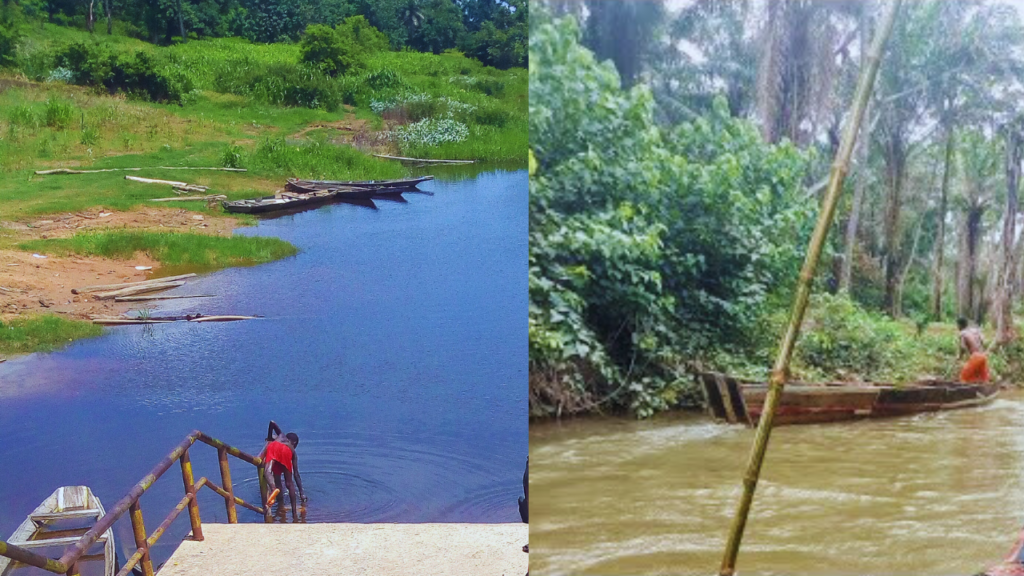
Ibagwa River is a river located in Ibagwa-Aka, Igboeze South Local Government Area of Enugu State, Nigeria. It is a tributary of the Oji River. The river is said to be have spiritual powers and is a major cultural and religious site for the Ibagwa-Aka people.
The river is believed to have dried up in the 1960s after the people of Ibagwa-Aka failed to perform certain sacrifices to it. It resurfaced in 2019, after over 40 years, following a series of rituals performed by the community. The resurfacing of the river was seen as a sign of good luck and prosperity for the people of Ibagwa-Aka.
The river is now a popular tourist destination, and is often visited by people seeking spiritual blessings. It is also a popular spot for fishing and swimming.
Here are some interesting facts about Ibagwa River:
- The river is said to be the home of a water spirit called Ezechitoke.
- The river is believed to have healing powers.
- The river is said to be able to grant wishes.
- The river is a popular spot for traditional weddings.
- The river is often used for baptisms.
- The river is a symbol of the Ibagwa-Aka people’s culture and heritage.
Ibagwa River is a beautiful and important river that is deeply significant to the Ibagwa-Aka people. It is a river of mystery, tradition, and hope.
10. Oji River
Oji River is a river in Enugu State, Nigeria. It is a tributary of the Enugu River. The Oji River originates in the Nsukka Mountains and flows through the towns of Oji River, Inyi, and Akpugoeze. It joins the Enugu River near the town of Udi.
The Oji River is a major source of water for the people of Enugu State. It is also used for irrigation, fishing, and recreation. The Oji River is also home to a number of species of fish, including catfish, tilapia, and carp.
In addition to its economic importance, the Oji River is also a significant cultural landmark. The Oji River is mentioned in a number of Igbo folktales and legends. The Oji River is also the site of the Oji River Leprosy Settlement, one of the largest and oldest leprosy rehabilitation settlements in Nigeria.
The Oji River is facing a number of challenges, including pollution, sedimentation, and climate change. These challenges are threatening the quality and availability of water for the people of Enugu State. It is important to take steps to protect the Oji River and ensure that it continues to be a reliable source of water for the future.
Here are some of the things that are being done to protect the Oji River:
- The Enugu State government has established a number of water treatment plants along the Oji River. These plants help to remove pollutants from the water before it is distributed to the public.
- The government is also working to plant trees along the banks of the Oji River. These trees help to prevent erosion and improve the quality of the water.
- The government is also working to educate the public about the importance of protecting the Oji River. This education includes teaching people about the dangers of pollution and how to prevent it.
These efforts are helping to protect the Oji River, but more needs to be done. It is important for everyone to do their part to protect this important resource.
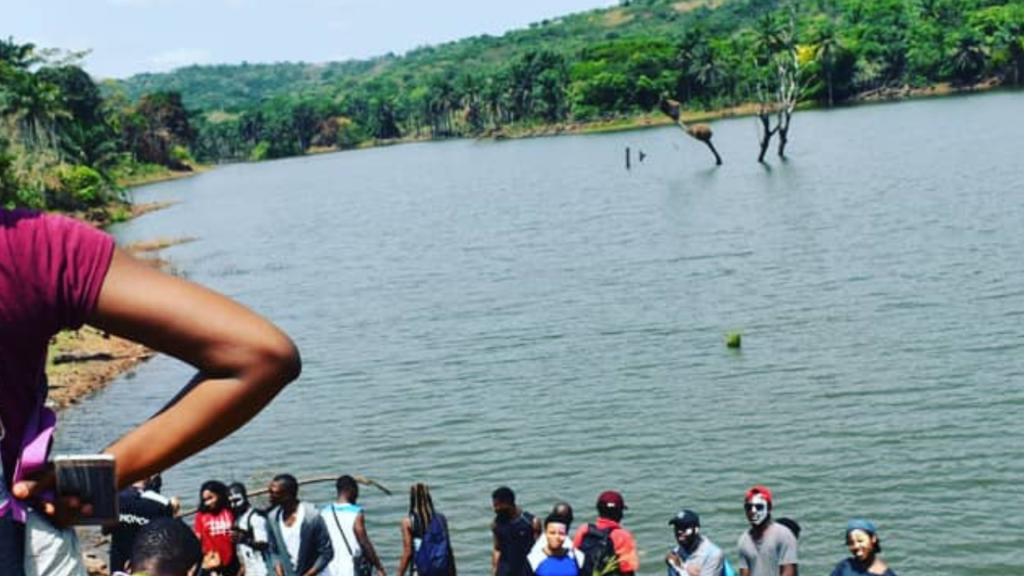
11. Orie River
Orie River is a river in Enugu State, Nigeria. It is a tributary of the Oji River. The Orie River originates in the Nsukka hills and flows through the towns of Nsukka, Ibagwa, and Udi. It joins the Oji River near the town of Agbani.
The Orie River is an important source of water for the people of Enugu State. It is used for drinking, irrigation, and fishing. The river is also popular for recreation, such as swimming and boating.
The Orie River is facing a number of challenges, including pollution, sedimentation, and climate change. These challenges are threatening the quality and availability of water for the people of Enugu State. It is important to take steps to protect the Orie River and ensure that it continues to be a reliable source of water for the future.
Here are some additional details about the Orie River:
- The Orie River is about 100 kilometers long.
- The river is widest at its confluence with the Oji River, where it is about 50 meters wide.
- The Orie River is home to a variety of fish species, including catfish, tilapia, and carp.
- The river is also home to a number of crocodiles.
- The Orie River is a popular destination for swimming, boating, and fishing.
- The Orie River is facing a number of challenges, including pollution, sedimentation, and climate change.
It is important to take steps to protect the Orie River and ensure that it continues to be a reliable source of water for the people of Enugu State. Some of the steps that can be taken to protect the Orie River include:
- Reducing pollution by industrial and agricultural runoff.
- Planting trees along the banks of the river to help prevent erosion.
- Building dams and levees to control flooding.
- Educating the public about the importance of protecting the river.
12. Nkanu River
The Nkanu River is a river in Enugu State, Nigeria. It is one of the largest rivers in the state and is a major source of water for the people of Nkanuland. The river originates in the Nkanu Mountains and flows through the towns of Nara Unateze, Inyi, and Nkanu West before joining the Oji River.
The Nkanu River is an important source of water for drinking, irrigation, and fishing. It is also a popular spot for recreation, including swimming, canoeing, and fishing. The river is home to a variety of fish species, including catfish, tilapia, and carp.
The Nkanu River is also a sacred river to the people of Nkanuland. The river is believed to be home to a goddess named Esu, who is said to protect the people of Nkanuland. There are a number of shrines dedicated to Esu along the banks of the river.
In recent years, the Nkanu River has been facing a number of challenges, including pollution, sedimentation, and climate change. These challenges are threatening the quality and availability of water for the people of Nkanuland. It is important to take steps to protect the river and ensure that it continues to be a reliable source of water for the future.
Here are some of the challenges facing the Nkanu River:
- Pollution: The Nkanu River is polluted by a variety of sources, including industrial wastewater, agricultural runoff, and sewage. This pollution is harming the fish population and making the water unsafe for drinking.
- Sedimentation: The Nkanu River is also facing the problem of sedimentation. Sedimentation is the buildup of sand and silt in the riverbed. This sedimentation is blocking the river’s flow and making it difficult for fish to spawn.
- Climate change: Climate change is also having an impact on the Nkanu River. The river is becoming more erratic and unpredictable, with periods of drought followed by flooding. This is making it difficult for people to rely on the river for water.
There are a number of things that can be done to protect the Nkanu River:
- Reduce pollution: Industries and farms need to be held accountable for their pollution. There needs to be more investment in wastewater treatment plants and sewage treatment plants.
- Prevent sedimentation: There needs to be more afforestation in the Nkanu Mountains. This will help to prevent soil erosion and sedimentation in the river.
- Adapt to climate change: People need to be prepared for the changing climate. This includes building dams and reservoirs to store water during droughts and developing flood control measures.
13. Ibagwa River
The Ibagwa River is a river in Enugu State, Nigeria. It is located in the Ibagwa-Aka community of Igboeze South Local Government Area. The river is a tributary of the Oji River.
The Ibagwa River is a sacred river for the Ibagwa-Aka people. It is believed to be the source of their prosperity and well-being. The river is also said to be home to a spirit called Ezechitoke, who is believed to protect the community.
In 1960, water from the Ibagwa River was used to build the University of Nigeria Nsukka. The river also provided water for irrigation and fishing for the people of Ibagwa-Aka.
In the late 1960s, the Ibagwa River mysteriously dried up. The people of Ibagwa-Aka believed that this was a punishment from Ezechitoke for their failure to worship him properly. They performed rituals to appease Ezechitoke, and the river eventually resurfaced.
The Ibagwa River is a symbol of the Ibagwa-Aka people’s culture and history. It is a source of pride and hope for the community. The river is also a reminder of the importance of respecting nature and the need to protect our environment.
In 2019, the Ibagwa River resurfaced after disappearing for over 4 decades. This was a cause for great celebration in the Ibagwa-Aka community. The people believe that the river’s return is a sign of good fortune and prosperity.
The Ibagwa River is a valuable resource for the people of Ibagwa-Aka. It is a source of water, food, and livelihood. The river is also a sacred place for the community. It is important to protect the Ibagwa River and ensure that it remains a source of life and prosperity for the people of Ibagwa-Aka.
14. Udi River
The Udi River is a river in Enugu State, Nigeria. It is a tributary of the Anambra River. The Udi River originates in the Udi Hills in the southeastern part of Enugu State. It flows in a southerly direction through the towns of Udi, Agbudu, and Nachi. The Udi River joins the Anambra River near the town of Nsukka.
The Udi River is a major source of water for the people of Udi Local Government Area. It is also used for irrigation, fishing, and recreation. The Udi River is also home to a number of species of fish, including catfish, tilapia, and lungfish.
In recent years, the Udi River has been polluted by industrial waste and sewage. This pollution has led to a decline in the quality of the water and has made it unsafe for drinking and bathing. The government of Enugu State is working to clean up the Udi River and restore it to its former glory.
In addition to the pollution challenges, the Udi River is also facing the threat of sedimentation. Sedimentation is the accumulation of soil and other materials in the riverbed. This can clog the river and make it difficult for fish to spawn. The government of Enugu State is also working to address the problem of sedimentation.
Despite the challenges it faces, the Udi River is an important resource for the people of Enugu State. It is a source of water, food, and recreation. The government of Enugu State is committed to protecting the Udi River and ensuring that it continues to be a valuable resource for the people of the state.
Here are some additional facts about the Udi River:
- The Udi River is about 100 kilometers long.
- The Udi River has a drainage basin of about 1,000 square kilometers.
- The Udi River is home to a number of species of fish, including catfish, tilapia, and lungfish.
- The Udi River is also used for irrigation and recreation.
- The Udi River is facing a number of challenges, including pollution, sedimentation, and climate change.
- The government of Enugu State is working to protect the Udi River and ensure that it continues to be a valuable resource for the people of the state.
15. Uzo Uwani River
The Uzo Uwani River is a river in Enugu State, Nigeria. It is a tributary of the Adada River, and it flows through the Uzo Uwani Local Government Area. The river is about 50 kilometers long, and it is a major source of water for the people of the area. It is also used for irrigation, fishing, and recreation.
The Uzo Uwani River is facing a number of challenges, including pollution, sedimentation, and climate change. These challenges are threatening the quality and availability of water for the people of the area. It is important to take steps to protect the river and ensure that it continues to be a reliable source of water for the future.
Here are some of the challenges facing the Uzo Uwani River:
- Pollution: The river is polluted by agricultural runoff, industrial waste, and sewage. This pollution is harming the fish populations in the river, and it is making the water unsafe to drink.
- Sedimentation: The river is also being silted up by sediment from the surrounding hills. This sedimentation is reducing the depth of the river, and it is making it more difficult for boats to navigate.
- Climate change: Climate change is causing the river to become more erratic. The river is sometimes flooding, and at other times it is drying up. This erratic behavior is making it difficult for people to rely on the river for water.
There are a number of things that can be done to protect the Uzo Uwani River:
- Reduce pollution: Farmers can be encouraged to use less fertilizer and pesticides, and industries can be required to treat their wastewater before discharging it into the river.
- Control sedimentation: Sedimentation can be controlled by planting trees along the banks of the river, and by building dams to trap sediment.
- Adapt to climate change: People can be encouraged to build water storage facilities to collect water during the rainy season, and to use water-saving technologies during the dry season.
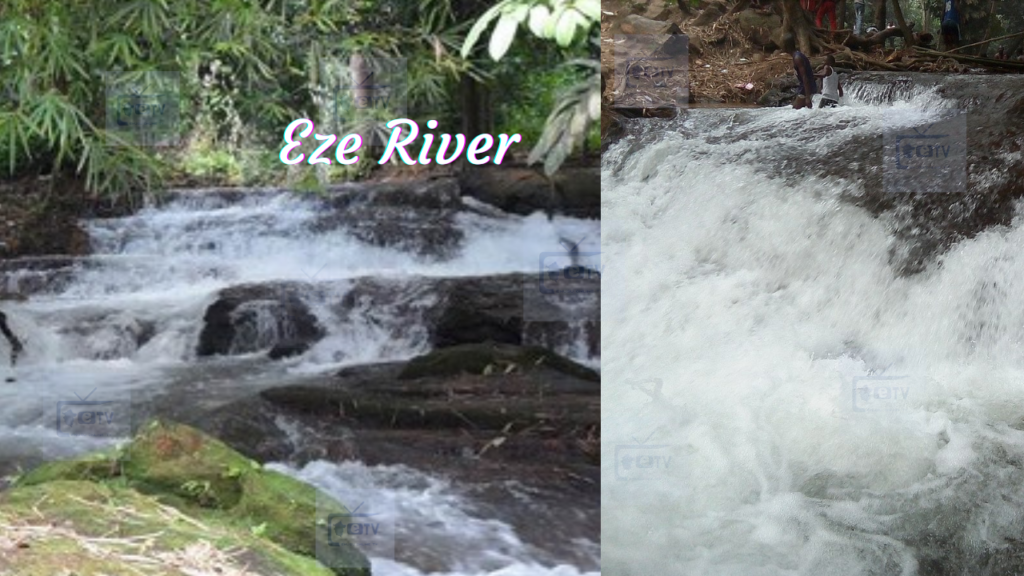
16. Eze River
The Eze River is a river in Enugu State, Nigeria. It is a tributary of the Oji River. The Eze River originates in the Nsukka hills and flows through the towns of Nsukka, Ibagwa, and Udi. It joins the Oji River near the town of Agbani.
The Eze River is an important source of water for the people of Enugu State. It is also used for irrigation, fishing, and recreation. The river is also home to a variety of wildlife, including crocodiles, hippopotamuses, and fish.
The Eze River is facing a number of challenges, including pollution, sedimentation, and climate change. These challenges are threatening the quality and availability of water for the people of Enugu State. It is important to take steps to protect the Eze River and ensure that it continues to be a reliable source of water for the future.
Here are some additional information about the Eze River:
- The Eze River is about 100 kilometers long.
- The river is widest at its mouth, where it is about 100 meters wide.
- The river is shallow in most places, but it can be deep in some areas.
- The Eze River is a perennial river, which means that it flows year-round.
- The river is home to a variety of plants and animals, including crocodiles, hippopotamuses, fish, and birds.
- The Eze River is used for a variety of purposes, including drinking water, irrigation, fishing, and recreation.
- The Eze River is facing a number of challenges, including pollution, sedimentation, and climate change.
It is important to protect the Eze River and ensure that it continues to be a reliable source of water for the people of Enugu State. Here are some things that can be done to protect the Eze River:
- Reduce pollution by disposing of waste properly.
- Plant trees along the riverbank to help prevent erosion.
- Build dams and levees to control flooding.
- Educate the public about the importance of the Eze River and how to protect it.
17. Nsukka River
Nsukka River is a river in Enugu State, Nigeria. It is located in the Nsukka Local Government Area, and it is a tributary of the Ekulu River. The Nsukka River is about 20 kilometers long, and it originates in the Nsukka hills. It flows through the towns of Nsukka, Ibagwa-Aka, and Ihe-Owerre, before joining the Ekulu River near the town of Opi.
The Nsukka River is an important source of water for the people of Nsukka. It is used for drinking, irrigation, fishing, and recreation. The river is also a popular spot for swimming and picnicking.
In the past, the Nsukka River was a much cleaner river. However, in recent years, the river has become polluted due to agricultural runoff, industrial waste, and sewage. This pollution has caused the water quality of the river to decline, and it has made the river unsafe for swimming and fishing.
There are a number of things that can be done to improve the water quality of the Nsukka River. These include:
- Reducing agricultural runoff by using more sustainable farming practices.
- Investing in wastewater treatment plants to reduce industrial and sewage pollution.
- Creating awareness about the importance of protecting the river among the local community.
By taking these steps, we can help to improve the water quality of the Nsukka River and make it a safe and healthy place for everyone to enjoy.
Here are some additional facts about the Nsukka River:
- The river is believed to be named after the Nsukka people, who are the predominant ethnic group in the area.
- The river is said to be home to a number of crocodiles, which are a popular tourist attraction.
- The river is also home to a number of fish species, including catfish, tilapia, and carp.
- The river is used for a number of traditional festivals, including the Adada New Yam Festival.
- The river is a popular spot for swimming and picnicking.
18. Igbo Eze North River
Igbo Eze North River is a river in Enugu State, Nigeria. It is located in the Igbo Eze North Local Government Area, and it is a tributary of the Oji River. The river is about 30 kilometers long, and it flows through the towns of Enugu Ezike, Ette, Ezzodo, and Ibagwa Aka.
The Igbo Eze North River is an important source of water for the people of the Igbo Eze North Local Government Area. It is used for drinking, irrigation, fishing, and recreation. The river is also home to a variety of aquatic life, including fish, turtles, and crocodiles.
In recent years, the Igbo Eze North River has been facing a number of challenges, including pollution, sedimentation, and climate change. These challenges are threatening the quality and availability of water for the people of the Igbo Eze North Local Government Area. It is important to take steps to protect the river and ensure that it continues to be a reliable source of water for the future.
Here are some of the challenges facing the Igbo Eze North River:
- Pollution: The river is polluted by agricultural runoff, industrial waste, and sewage. This pollution is causing the water quality to decline, and it is making the river unsafe for drinking and recreation.
- Sedimentation: The river is also being affected by sedimentation. Sediment is being washed into the river from deforested areas, and it is clogging the riverbed. This is making it difficult for the river to flow freely, and it is also making the water quality worse.
- Climate change: Climate change is also affecting the Igbo Eze North River. The river is becoming more erratic, and it is experiencing more droughts and floods. This is making it difficult for the people who rely on the river for their livelihood.
There are a number of things that can be done to protect the Igbo Eze North River:
- Reduce pollution: The government can work to reduce pollution from agricultural runoff, industrial waste, and sewage. This can be done by enforcing environmental regulations, and by providing funding for wastewater treatment plants.
- Control sedimentation: The government can also work to control sedimentation by planting trees in deforested areas, and by building dams and levees to slow the flow of water.
- Adapt to climate change: The government can help the people who rely on the river to adapt to climate change by providing them with drought-resistant crops, and by helping them to build flood-resistant infrastructure.
19. Igbo Eze South River
The Igbo Eze South River is a river located in Igbo Eze South Local Government Area of Enugu State, Nigeria. It is a tributary of the Oji River. The river originates from the hills of Nkalagu and flows through the towns of Ibagwa-Aka, Iheakpu-Awka, and Ovoko. It joins the Oji River near the town of Inyi.
The Igbo Eze South River is an important source of water for the people of Igbo Eze South Local Government Area. It is also used for irrigation, fishing, and recreation. However, the river is facing a number of challenges, including pollution, sedimentation, and climate change. These challenges are threatening the quality and availability of water for the people of Igbo Eze South Local Government Area.
There are a number of things that can be done to protect the Igbo Eze South River. These include:
- Reducing pollution from agricultural runoff and industrial wastewater.
- Planting trees along the banks of the river to help prevent erosion.
- Building dams to regulate the flow of water and reduce flooding.
- Raising awareness about the importance of protecting the river among the local communities.
By taking these steps, we can help to ensure that the Igbo Eze South River remains a healthy and sustainable source of water for the people of Enugu State.
Here are some additional details about the Igbo Eze South River:
- The river is about 50 kilometers long.
- The river is mostly shallow, with a maximum depth of about 5 meters.
- The river is home to a variety of fish species, including catfish, tilapia, and carp.
- The river is also used for swimming and other recreational activities.
- The river is facing a number of challenges, including pollution, sedimentation, and climate change.
20. Nkanu West River
Nkanu West River is a river in Enugu State, Nigeria. It is located in the Nkanu West Local Government Area of the state. The river originates from the Nkanu Hills and flows in a southerly direction through the towns of Agbani, Akpugo, and Akegbe Ugwu. It then joins the Oji River near the town of Obe.
The Nkanu West River is a vital source of water for the people of Nkanu West Local Government Area. It is used for drinking, irrigation, fishing, and recreation. The river is also important for the local economy, as it is used to transport goods and services.
However, the Nkanu West River is facing a number of challenges, including pollution, sedimentation, and climate change. These challenges are threatening the quality and availability of water for the people of Nkanu West Local Government Area. It is important to take steps to protect the river and ensure that it continues to be a reliable source of water for the future.
Here are some of the challenges facing the Nkanu West River:
- Pollution: The Nkanu West River is polluted by domestic sewage, industrial waste, and agricultural runoff. This pollution is harmful to the aquatic life in the river and can make the water unsafe for drinking.
- Sedimentation: The Nkanu West River is also affected by sedimentation. Sedimentation is the process of soil and other materials being washed into the river by rainwater. This sedimentation can clog the riverbed and make it difficult for the river to flow freely.
- Climate change: Climate change is also having an impact on the Nkanu West River. The river is becoming more erratic, with periods of drought alternating with periods of flooding. This makes it difficult for people to rely on the river for their water needs.
There are a number of things that can be done to protect the Nkanu West River:
- Reduce pollution: The government can work to reduce pollution in the river by building sewage treatment plants and enforcing environmental regulations.
- Control sedimentation: The government can control sedimentation by planting trees along the riverbanks and building dams to slow down the flow of water.
- Adapt to climate change: The government can help people to adapt to climate change by building water storage facilities and providing drought-resistant crops.
These rivers are all important sources of water for the people of Enugu State. They are also used for irrigation, fishing, and recreation. Some of the rivers, such as the Oji River, are also used for generating electricity.
The rivers in Enugu State are facing a number of challenges, including pollution, sedimentation, and climate change. These challenges are threatening the quality and availability of water for the people of Enugu State. It is important to take steps to protect the rivers and ensure that they continue to be a reliable source of water for the future.










